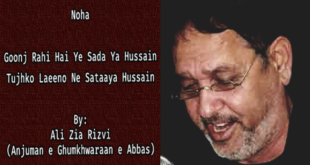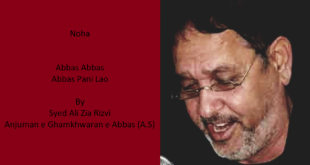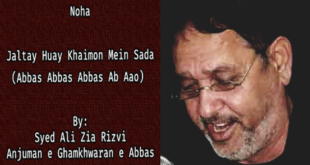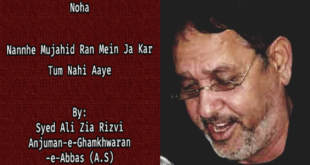Kartay Thay Sarwar Buka Haaye Kamar Jhuk Gayi Kartay thay Sarwar buka haaye kamar jhuk gayiMar gaya bhai mera haaye kamar jhuk gayi Mar gaye hum jeetay jee chhut gaye hum se akheeHo gaye baazu juda haaye kamar jhuk gayiMar gaya bhai mera haaye kamar jhuk gayi Kartay thay Sarwar …
Read More »Goonj Rahi Hai Ye Sada (Noha) – Ali Zia Rizvi Vol. 1
Goonj Rahi Hai Ye Sada Goonj rahi hai ye sada Ya HussainTujh ko laeeno ne sataaya HussainYa Hussain Ya HussainYa Hussain Ya Hussain Teen shab o roz ka pyaasa HussainDasht e bala mein tujhe maara HussainYa Hussain (x4) Baiyat e faasik ke talabgaar thayZulm o sitam ke liye tayyar thayKitne …
Read More »Nala Ba Lab e Zainab (Noha) – Ali Zia Rizvi 1980s
Nala ba lab e Zainab e lachaar Hussaina Nala ba lab e Zainab e lachaar Hussaina Maujood hain ahbaab na ansaar HussainaNala ba lab… Hai chaaro taraf nargha e kuffaar HussainaNala ba lab… Faryaad nahi koi madadgaar HussainaNala ba lab… Ab koi nahi sab mah e anwar gaye maaray (x2)Saath …
Read More »Abbas Pani Lao (Noha) – Ali Zia Rizvi 1980s
Abbas Pani Lao Zainab ye ro ke boli bhayya na dil dukhaoKya deir ka sabab hai ye to hamein bataoMashkeeza bhar ke jaldi darya se laut aaoBachhi ki tashnagi ko tum aa ke khud bujhaoAbbas Abbas Abbas pani lao… Wo ghamzada yakeenan yaadon mein kho gayi haiBaba ko rotay rotay …
Read More »Aye Dilbaraan-e-Jaffar-e-Tayyar – Ali Zia Rizvi 1980s
Aye Dilbaraan-e-Jaffar-e-Tayyar Aye dilbaraan-e-Jaffar-e-TayyarAlwida alwida alwida alwida Bint-e-Ali ye bachoan se kehti thi baar baar (x2)Ran ko sidhaaro Aun-o-Muhammad ye maa nisaarAye dilbaraan-e-Jaffar-e-Tayyar Alwida Alwida Alwida AlwidaAye dilbaraan…Alwida Alwida Alwida Alwida Jaffar ka iftikhaar badhaana jihaad mein (x2)Naana ki apnay shaan dikhaana jihaad meinAye dilbaraan… Alwida Alwida Alwida AlwidaAye dilbaraan…Alwida …
Read More »Jaltay Huay Khaimon Mein – Ali Zia Rizvi 1980s
Jaltay Huay Khaimon Mein Jaltay huay khaimon mein sada goonj rahi hai (x2)Abbas Abbas Abbas ab aao Jaltay huay khaimon mein sada goonj rahi hai (x2) Ye lashkar-e-be deen rida chheen raha hai (x2)Saidaaniyon pa shimr ki durroan se jafa haiAbbas Abbas Abbas bachaao Jaltay huay khaimon… (x2) Na mehramo …
Read More »Nannhe Mujahid Ran Mein Ja Kar – Ali Zia Rizvi 1980s
Nannhe Mujahid Ran Mein Ja Kar Nannhe mujahid ran mein ja kar tum nahi aayeShaah to aaye jaan-e-maadar tum nahi aaye (Nannhe mujahid ran mein ja kar tum nahi aaye) x2 Kab se khadi hoon khaimay ke dar par (x2)Aankhon mein le kar ashkoan ke saagar (x2)Pesh karoon aa jaao …
Read More »Ho Gaya Marna Sitam Abbas Ka – Ali Yazda Rizvi 2010-11
Ho Gaya Marna Sitam Abbas Ka Ho gaya marna sitam Abbas ka (x4) Kartay hain matam haram Abbas kaHo gaya marna sitam Abbas ka Aata hai zakhmi alam Abbas kaHo gaya marna… Kartay hain matam haram Abbas kaHo gaya marna… Haaye lab-e-nehar hua kya ghazabTeer laga mashk-e-Sakina pe jabAa gaya …
Read More »Aa Gaya Maah-e-Aza Aansu Baha Lo Fatima – Razi Rizvi 1980s
Aa Gaya Maah-e-Aza aansu baha lo Fatima Apnay betay ki saf-e-maatam bicha lo FatimaAa gaya maah-e-aza aansu baha lo Fatima Aa gaya… (x2) Aag se Sajjad ko aa kar nikaalo Fatima (x2)Aray aa kar nikaalo FatimaJal na jaaye Abid-e-Muztar bacha lo Fatima Aa gaya… (x2) Chheen kar chaadar saroan se …
Read More »Mujhpe Kyun Band Kartay – Nadeem Sarwar 1992-93
Mujhpe Kyun Band Kartay (Ya Hussain Ya HussainYa Hussain Ya Hussain) x2 Mujhpe kyun band kartay ho paaniKya Muhammad ka pyaara nahi hoon (Mujhpe kyun band kartay ho paaniKya Muhammad ka pyaara nahi hoon) x2 Mujhpe kyun band kartay ho paaniKalma goyo Muhammad ke shaamiKya main mehmaan aaya nahi hoonKya …
Read More » Abul Hasan Lakhani About Everything I Love!
Abul Hasan Lakhani About Everything I Love!









